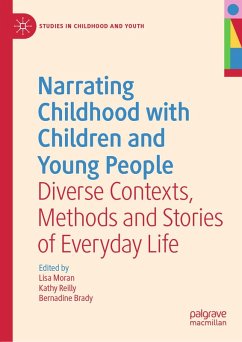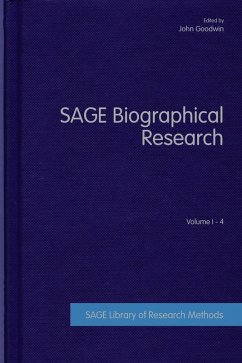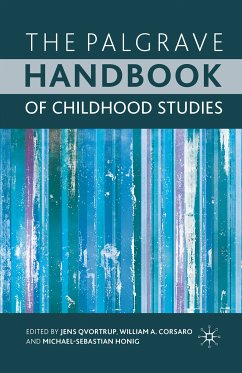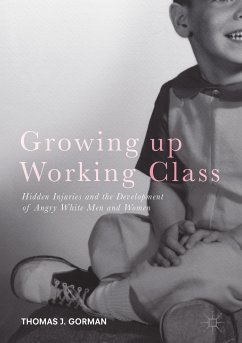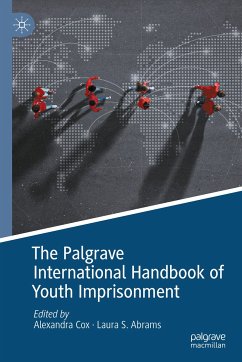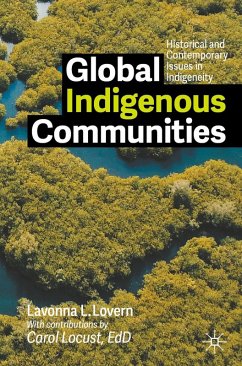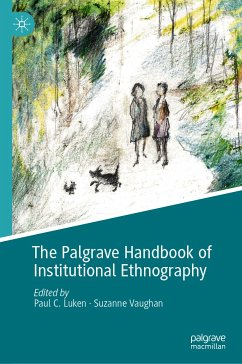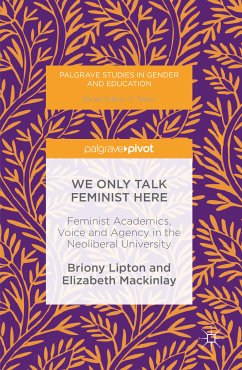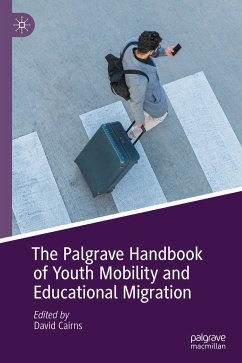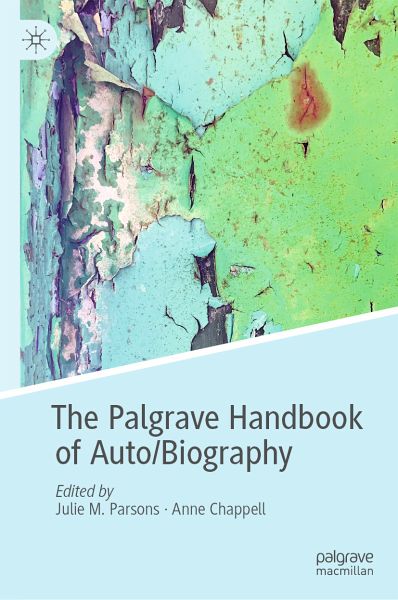
The Palgrave Handbook of Auto/Biography (eBook, PDF)
Versandkostenfrei!
Sofort per Download lieferbar
136,95 €
inkl. MwSt.
Weitere Ausgaben:

PAYBACK Punkte
68 °P sammeln!
In a neo-liberal era concerned with discourses of responsible individualism and the 'selfie', there is an increased interest in personal lives and experiences. In contemporary life, the personal is understood to be political and these ideas cut across both the social sciences and humanities.This handbook is specifically concerned with auto/biography, which sits within the field of narrative, complementing biographical and life history research. Some of the contributors emphasise the place of narrative in the construction of auto/biography, whilst others disrupt the perceived boundaries between...
In a neo-liberal era concerned with discourses of responsible individualism and the 'selfie', there is an increased interest in personal lives and experiences. In contemporary life, the personal is understood to be political and these ideas cut across both the social sciences and humanities.
This handbook is specifically concerned with auto/biography, which sits within the field of narrative, complementing biographical and life history research. Some of the contributors emphasise the place of narrative in the construction of auto/biography, whilst others disrupt the perceived boundaries between the individual and the social, the self and the other. The collection has nine sections: creativity and collaboration; families and relationships; epistolary lives; geography; madness; prison lives; professional lives; 'race'; and social justice and disability. They illustrate the inter- and multi-disciplinary nature of auto/biography as a field. Each section features an introduction froma section editor, many of whom are established researchers and/or members of the British Sociological Association (BSA) Auto/Biography study group.
The handbook provides the reader with cutting-edge research from authors at different stages in their careers, and will appeal to those with an interest in auto/biography, auto-ethnography, epistolary traditions, lived experiences, narrative analysis, the arts, education, politics, philosophy, history, personal life, reflexivity, research in practice and the sociology of the everyday.
Chapter 1: A Case for Auto/Biography; Julie Parsons and Anne Chappell.
Section One: Creativity and Collaboration; edited by Gayle Letherby.
Chapter 2: The Times are a Changing: Culture(s) of Medicine; Theresa Compton.
Chapter 3: Seventeen Minutes and Thirty-One Seconds: An Auto/Biographical Account of Collaboratively Witnessing and Representing an Untold Life Story; Kitrina Douglas andDavid Carless.
Chapter 4: Reflections on a Collaborative, Creative 'Working' Relationship; Deborah Davidson and Gayle Letherby.
Section Two: Families and Relationships: Auto/Biography and Family, A Natural Affinity?; edited by David Morgan.
Chapter 5: Life Story and Narrative Approaches in the Study of Family Lives; Julia Brannen.
Chapter 6: The Research Methods for Discovering Housing Inequalities in Socio-Biographical Studies; Elizaveta Polukhina.
Chapter 7: Auto/Biographical Research and The Family; Aidan Seery and Karin Bacon.
Section Three: Epistolary Lives: Fragments, Sensibility, Assemblages in Auto/Biographical Research; edited by Maria Tamboukou.
Chapter 8: Letter-Writing and the Actual Course of Things: Doing the Business, Helping the World Go Round; Liz Stanley.
Chapter 9: The Unforeseeable Narrative: Epistolary Lives in Nineteenth Century Iceland; Erla Hulda Halldórsdóttir.
Chapter 10: Auto/Pathographies In Situ: 'Dying of Melancholy' in Nineteenth Century Greece; Dimitra Vassiliadou.
Section Four: Geography Matters: Spatiality and Auto/Biography; edited by John Barker and Emma Wainwright.
Chapter 11: "Trying to Keep Up": Intersections of Identity, Space, Time and Rhythm in Women Student Carer Auto/Biographical Accounts; Fin Cullen, John Barker and Pam Alldred.
Chapter 12: Spatiality and Auto/Biographical Narratives of Encounter in Social Housing; Emma Wainwright, Elodie Marandet and Ellen McHugh.
Chapter 13: "I Thought... I Saw... I Heard...": The Ethical and Moral Tensions of Auto/Biographically Opportunistic Research in Public Spaces; Tracy Ann Hayes.
Section Five: Madness, Dys-order and Autist/Biography: Auto/Biographical Challenges to Psychiatric Dominance; edited by Kay Inckle.
Chapter 14: Autist/Biography; Alyssa Hillary.
Chapter 15: Reaching Beyond Auto? A Polyvocal Representation of Recovery From "Eating Dys-order"; Bríd O'Farrell.
Chapter 16: [R]evolving Towards Mad: Spinning Away from the Psy/Spy-Complex Through Auto/Biography; Phil Smith.
Section Six: Prison Lives; edited by Dennis Smith.
Chapter 17: Nelson Mandela: Courage and Conviction - The Making of a Leader; Dennis Smith.
Chapter 18: The "Other" Prison of Antonio Gramsci and Giulia Schucht; Jeni Nicholson.
Chapter 19: Bobby Sands: Prison and the Formation of a Leader; Denis O'Hearn. - Section Seven: Professional Lives; edited by Jenny Byrne.
Chapter 20: Academic Lives in a Period of Transition in Higher Education: Bildung in Educational Auto/Biography; Irene Selway, Jenny Byrne and Anne Chappell.
Chapter 21: Narratives of Early Career Teachers in a Changing Professional Landscape; Glenn Stone.
Chapter 22: What Does it Mean to be a Young Professional Graduate Working in the Private Sector?; Jenny Byrne.
Section Eight: 'Race' and Cultural Difference; edited by Geraldine Brown.
Chapter 23: Now You See Me, Now You Don't! Making Sense of the Black and Minority Ethnic (BME) Experience of UK Higher Education: One Person's Story; Gurnam Singh.
Chapter 24: Raging Against the Dying of the Light; Paul Grant.
Chapter 25: Black Young Men: Problematisation, Humanisation and Effective Engagement; Carver Anderson.
Section Nine: Social Justice and Disability: Voices From the Inside; by Chrissie Rogers.
Chapter 26: Missing Data and Socio-Political Death: The Sociological Imagination Beyond the Crime; Chrissie Roger.
Chapter 27: Co-Constructed Auto/Biographies in Dwarfism Mothering Research: Imagining Opportunities for Social Justice; Kelly-Mae Saville.
Chapter 28: An Auto/Biographical Account of Managing Autism and a Hybrid Identity: 'Covering' for Eight Days Straight; Amy Simmons.
This handbook is specifically concerned with auto/biography, which sits within the field of narrative, complementing biographical and life history research. Some of the contributors emphasise the place of narrative in the construction of auto/biography, whilst others disrupt the perceived boundaries between the individual and the social, the self and the other. The collection has nine sections: creativity and collaboration; families and relationships; epistolary lives; geography; madness; prison lives; professional lives; 'race'; and social justice and disability. They illustrate the inter- and multi-disciplinary nature of auto/biography as a field. Each section features an introduction froma section editor, many of whom are established researchers and/or members of the British Sociological Association (BSA) Auto/Biography study group.
The handbook provides the reader with cutting-edge research from authors at different stages in their careers, and will appeal to those with an interest in auto/biography, auto-ethnography, epistolary traditions, lived experiences, narrative analysis, the arts, education, politics, philosophy, history, personal life, reflexivity, research in practice and the sociology of the everyday.
Chapter 1: A Case for Auto/Biography; Julie Parsons and Anne Chappell.
Section One: Creativity and Collaboration; edited by Gayle Letherby.
Chapter 2: The Times are a Changing: Culture(s) of Medicine; Theresa Compton.
Chapter 3: Seventeen Minutes and Thirty-One Seconds: An Auto/Biographical Account of Collaboratively Witnessing and Representing an Untold Life Story; Kitrina Douglas andDavid Carless.
Chapter 4: Reflections on a Collaborative, Creative 'Working' Relationship; Deborah Davidson and Gayle Letherby.
Section Two: Families and Relationships: Auto/Biography and Family, A Natural Affinity?; edited by David Morgan.
Chapter 5: Life Story and Narrative Approaches in the Study of Family Lives; Julia Brannen.
Chapter 6: The Research Methods for Discovering Housing Inequalities in Socio-Biographical Studies; Elizaveta Polukhina.
Chapter 7: Auto/Biographical Research and The Family; Aidan Seery and Karin Bacon.
Section Three: Epistolary Lives: Fragments, Sensibility, Assemblages in Auto/Biographical Research; edited by Maria Tamboukou.
Chapter 8: Letter-Writing and the Actual Course of Things: Doing the Business, Helping the World Go Round; Liz Stanley.
Chapter 9: The Unforeseeable Narrative: Epistolary Lives in Nineteenth Century Iceland; Erla Hulda Halldórsdóttir.
Chapter 10: Auto/Pathographies In Situ: 'Dying of Melancholy' in Nineteenth Century Greece; Dimitra Vassiliadou.
Section Four: Geography Matters: Spatiality and Auto/Biography; edited by John Barker and Emma Wainwright.
Chapter 11: "Trying to Keep Up": Intersections of Identity, Space, Time and Rhythm in Women Student Carer Auto/Biographical Accounts; Fin Cullen, John Barker and Pam Alldred.
Chapter 12: Spatiality and Auto/Biographical Narratives of Encounter in Social Housing; Emma Wainwright, Elodie Marandet and Ellen McHugh.
Chapter 13: "I Thought... I Saw... I Heard...": The Ethical and Moral Tensions of Auto/Biographically Opportunistic Research in Public Spaces; Tracy Ann Hayes.
Section Five: Madness, Dys-order and Autist/Biography: Auto/Biographical Challenges to Psychiatric Dominance; edited by Kay Inckle.
Chapter 14: Autist/Biography; Alyssa Hillary.
Chapter 15: Reaching Beyond Auto? A Polyvocal Representation of Recovery From "Eating Dys-order"; Bríd O'Farrell.
Chapter 16: [R]evolving Towards Mad: Spinning Away from the Psy/Spy-Complex Through Auto/Biography; Phil Smith.
Section Six: Prison Lives; edited by Dennis Smith.
Chapter 17: Nelson Mandela: Courage and Conviction - The Making of a Leader; Dennis Smith.
Chapter 18: The "Other" Prison of Antonio Gramsci and Giulia Schucht; Jeni Nicholson.
Chapter 19: Bobby Sands: Prison and the Formation of a Leader; Denis O'Hearn. - Section Seven: Professional Lives; edited by Jenny Byrne.
Chapter 20: Academic Lives in a Period of Transition in Higher Education: Bildung in Educational Auto/Biography; Irene Selway, Jenny Byrne and Anne Chappell.
Chapter 21: Narratives of Early Career Teachers in a Changing Professional Landscape; Glenn Stone.
Chapter 22: What Does it Mean to be a Young Professional Graduate Working in the Private Sector?; Jenny Byrne.
Section Eight: 'Race' and Cultural Difference; edited by Geraldine Brown.
Chapter 23: Now You See Me, Now You Don't! Making Sense of the Black and Minority Ethnic (BME) Experience of UK Higher Education: One Person's Story; Gurnam Singh.
Chapter 24: Raging Against the Dying of the Light; Paul Grant.
Chapter 25: Black Young Men: Problematisation, Humanisation and Effective Engagement; Carver Anderson.
Section Nine: Social Justice and Disability: Voices From the Inside; by Chrissie Rogers.
Chapter 26: Missing Data and Socio-Political Death: The Sociological Imagination Beyond the Crime; Chrissie Roger.
Chapter 27: Co-Constructed Auto/Biographies in Dwarfism Mothering Research: Imagining Opportunities for Social Justice; Kelly-Mae Saville.
Chapter 28: An Auto/Biographical Account of Managing Autism and a Hybrid Identity: 'Covering' for Eight Days Straight; Amy Simmons.
Dieser Download kann aus rechtlichen Gründen nur mit Rechnungsadresse in A, B, BG, CY, CZ, D, DK, EW, E, FIN, F, GR, HR, H, IRL, I, LT, L, LR, M, NL, PL, P, R, S, SLO, SK ausgeliefert werden.
Alle Preise in Euro und inkl. der gesetzl. MwSt. | Innerhalb Deutschlands liefern wir preisgebundene Bücher versandkostenfrei. Weitere Informationen: bitte hier klicken
Support
Bitte wähle dein Anliegen aus:
Rechnungen
Bestellstatus
Retourenschein
Storno



